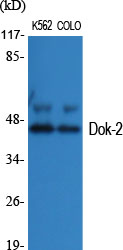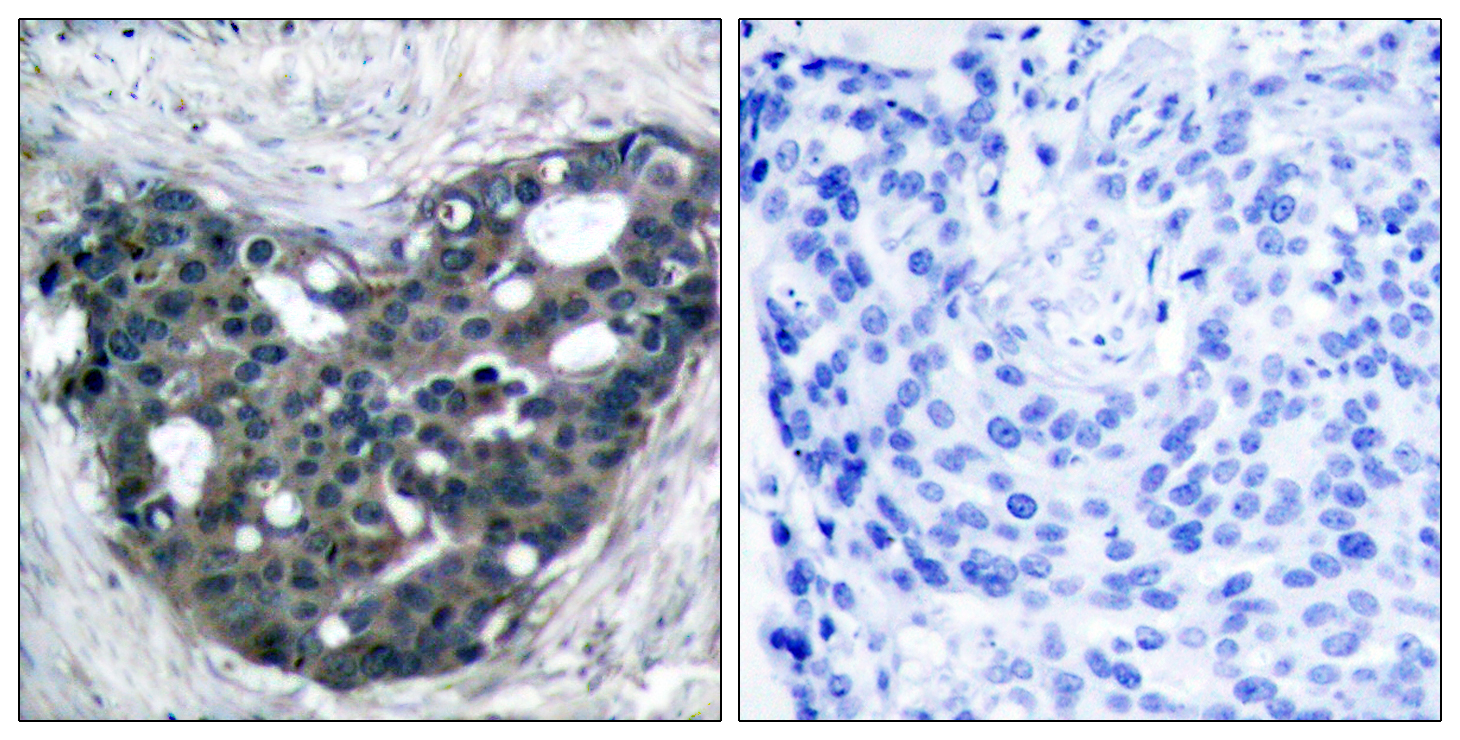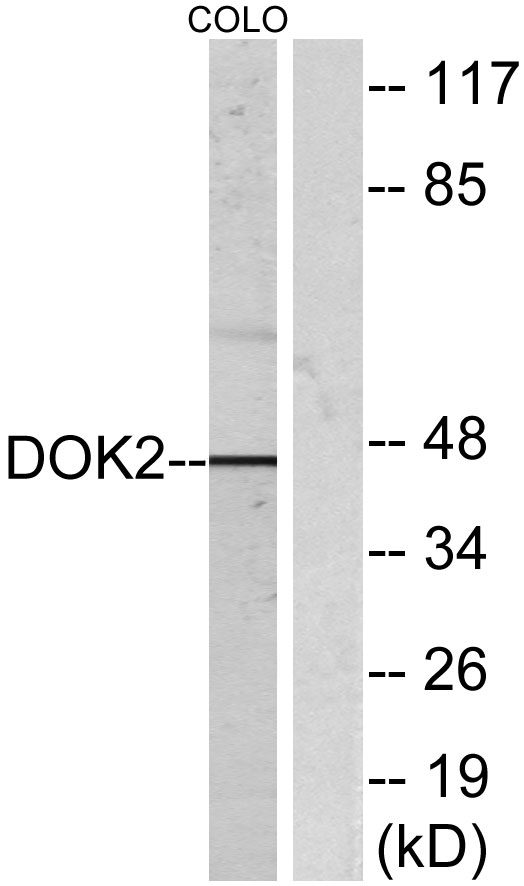Dok-2 Polyclonal Antibody
- Catalog No.:YT1396
- Applications:WB;IHC;IF;ELISA
- Reactivity:Human;Mouse
- Target:
- Dok-2
- Gene Name:
- DOK2
- Protein Name:
- Docking protein 2
- Human Gene Id:
- 9046
- Human Swiss Prot No:
- O60496
- Mouse Gene Id:
- 13449
- Mouse Swiss Prot No:
- O70469
- Immunogen:
- The antiserum was produced against synthesized peptide derived from human p56 Dok-2. AA range:266-315
- Specificity:
- Dok-2 Polyclonal Antibody detects endogenous levels of Dok-2 protein.
- Formulation:
- Liquid in PBS containing 50% glycerol, 0.5% BSA and 0.02% sodium azide.
- Source:
- Polyclonal, Rabbit,IgG
- Dilution:
- WB 1:500 - 1:2000. IHC 1:100 - 1:300. IF 1:200 - 1:1000. ELISA: 1:20000. Not yet tested in other applications.
- Purification:
- The antibody was affinity-purified from rabbit antiserum by affinity-chromatography using epitope-specific immunogen.
- Concentration:
- 1 mg/ml
- Storage Stability:
- -15°C to -25°C/1 year(Do not lower than -25°C)
- Other Name:
- DOK2;Docking protein 2;Downstream of tyrosine kinase 2;p56(dok-2)
- Observed Band(KD):
- 46kD
- Background:
- docking protein 2(DOK2) Homo sapiens The protein encoded by this gene is constitutively tyrosine phosphorylated in hematopoietic progenitors isolated from chronic myelogenous leukemia (CML) patients in the chronic phase. It may be a critical substrate for p210(bcr/abl), a chimeric protein whose presence is associated with CML. This encoded protein binds p120 (RasGAP) from CML cells. [provided by RefSeq, Jul 2008],
- Function:
- domain:PTB domain mediates receptor interaction.,function:DOK proteins are enzymatically inert adaptor or scaffolding proteins. They provide a docking platform for the assembly of multimolecular signaling complexes. DOK2 may modulate the cellular proliferation induced by IL-4, as well as IL-2 and IL-3. May be involved in modulating Bcr-Abl signaling. Attenuates EGF-stimulated MAP kinase activation.,PTM:On immunoreceptor stimulation, phosphorylated on C-terminal tyrosine residues. Phosphorylation on Tyr-345 is required for binding to the SH2 domain of NCK. Phosphorylation on both Tyr-271 and Tyr-299 is required for interaction with RASGAP.,similarity:Belongs to the DOK family. Type A subfamily.,similarity:Contains 1 IRS-type PTB domain.,similarity:Contains 1 PH domain.,subunit:Interacts with phosphorylated RASGAP and EGFR. Interacts with RET and NCK.,tissue specificity:Highly expressed in
- Subcellular Location:
- cytosol,
- Expression:
- Highly expressed in peripheral blood leukocytes, lymph nodes and spleen. Lower expression in thymus, bone marrow and fetal liver.
- June 19-2018
- WESTERN IMMUNOBLOTTING PROTOCOL
- June 19-2018
- IMMUNOHISTOCHEMISTRY-PARAFFIN PROTOCOL
- June 19-2018
- IMMUNOFLUORESCENCE PROTOCOL
- September 08-2020
- FLOW-CYTOMEYRT-PROTOCOL
- May 20-2022
- Cell-Based ELISA│解您多样本WB检测之困扰
- July 13-2018
- CELL-BASED-ELISA-PROTOCOL-FOR-ACETYL-PROTEIN
- July 13-2018
- CELL-BASED-ELISA-PROTOCOL-FOR-PHOSPHO-PROTEIN
- July 13-2018
- Antibody-FAQs
- Products Images

- Western Blot analysis of various cells using Dok-2 Polyclonal Antibody
.jpg)
- Western Blot analysis of COLO205 cells using Dok-2 Polyclonal Antibody

- Immunohistochemistry analysis of paraffin-embedded human breast carcinoma tissue, using p56 Dok-2 Antibody. The picture on the right is blocked with the synthesized peptide.

- Western blot analysis of lysates from COLO205, using p56 Dok-2 Antibody. The lane on the right is blocked with the synthesized peptide.



